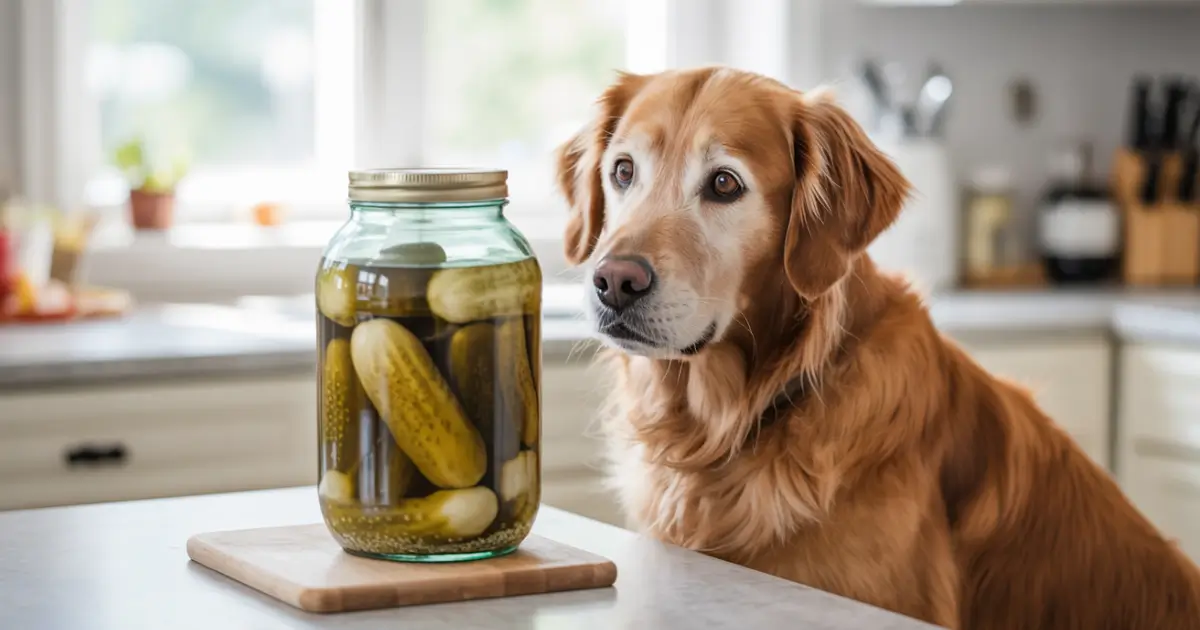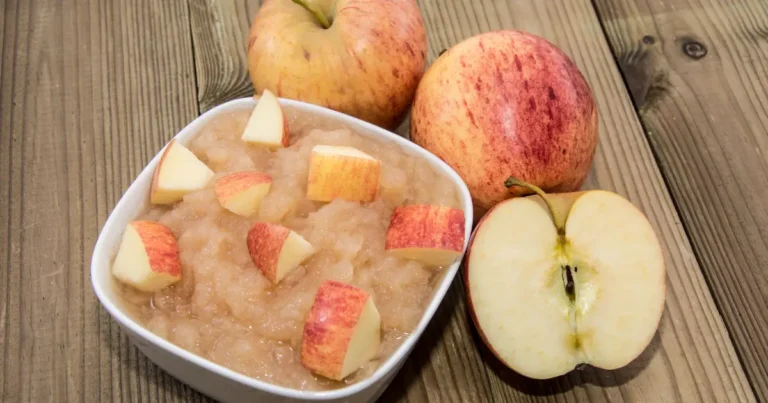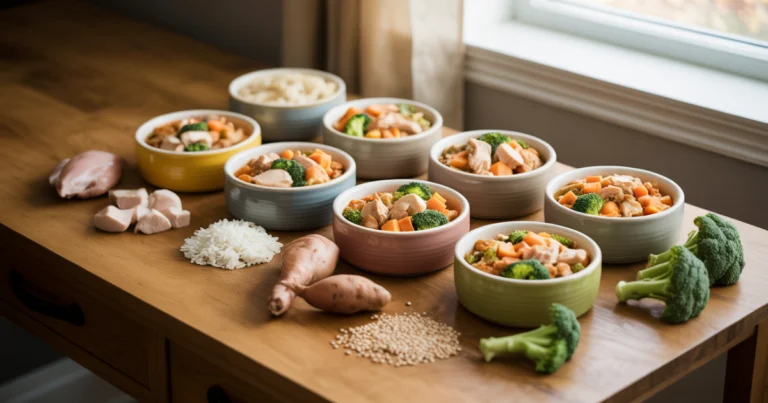Can Dogs Eat Pickles? 6 Important Safety Guidelines
When your dog gives you those pleading eyes as you enjoy a sandwich with pickles, you might wonder, “can dogs eat pickles?” While not immediately toxic, pickles require careful consideration before sharing with your furry friend. This comprehensive guide explores whether pickles are appropriate for canine consumption and provides six essential safety guidelines every dog owner should know.
Table of Contents
Understanding Pickles: Ingredients and Concerns
Before determining are pickles safe for dogs, it’s important to understand what pickles actually are and what they contain that might affect your pet’s health.
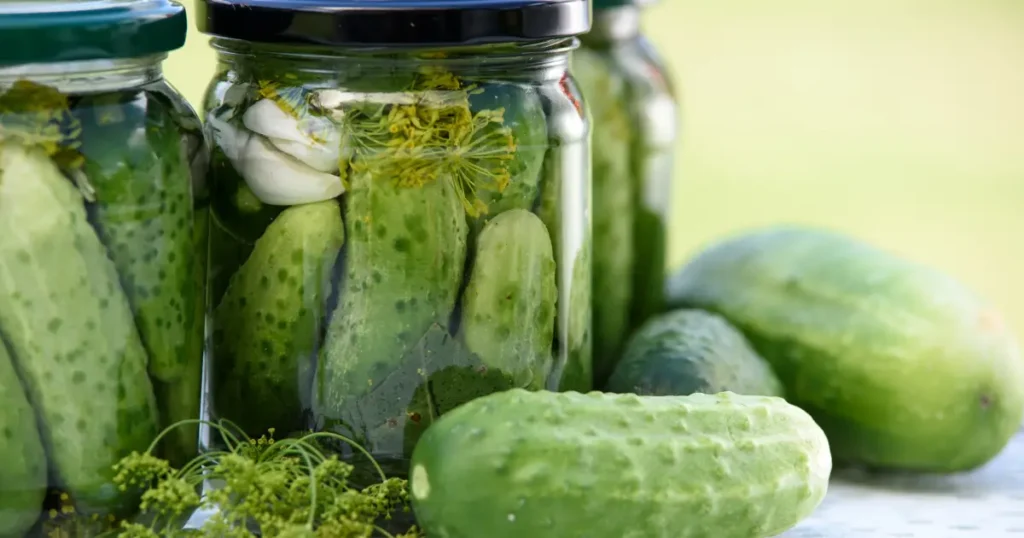
What Are Pickles?
Pickles are cucumbers that have been kept in a solution usually including:
- Vinegar (usually white or apple cider vinegar)
- Salt (often in high amounts)
- Water
- Spices and seasonings (which may include garlic, onions, dill, or other herbs)
- Sometimes sugar (particularly in sweet pickle varieties)
The preservation process creates that distinctive tangy flavor humans enjoy but introduces several ingredients that raise concerns when considering if can a dog eat a pickle safely.
Primary Concerns for Dogs
The main issues with pickles for dogs include:
- High sodium content: Most pickles contain significant amounts of salt, which can be problematic for dogs, especially those with certain health conditions.
- Spices and seasonings: Many pickle recipes include garlic or onions, which are toxic to dogs even in small amounts.
- Vinegar: While not toxic, the high acidity may cause digestive upset in some dogs.
- Added ingredients: Specialty pickles might contain additional concerning ingredients like sugar, artificial preservatives, or spicy peppers.
With these concerns in mind, let’s explore six important guidelines to follow when considering are pickles bad for dogs and whether to share this snack.
6 Important Guidelines for Feeding Pickles to Dogs
Consider these crucial guidelines to determine whether can dogs eat pickles in your specific situation:
1. Check the Sodium Content
The most significant concern when determining if can dogs have pickles is the high sodium content. The 300–500 mg of sodium per spear in regular dill pickles is too much for dogs, especially tiny breeds.
Why sodium is problematic:
- Dogs have much lower daily sodium requirements than humans
- More urine and thirst can be caused by too much salt.
- High sodium intake may contribute to dehydration
- Dogs with heart, kidney, or liver conditions are particularly vulnerable to sodium’s effects
- Long-term high sodium consumption can contribute to high blood pressure
For perspective, a 33-pound dog should consume no more than 100mg of sodium daily according to veterinary guidelines. One small pickle spear could exceed that amount several times over.
2. Avoid Pickles with Harmful Ingredients
When thinking about whether pickles are safe for your furry friend, it’s a good idea to take a peek at the ingredient list. Be sure to skip any pickles that have:
- Garlic or onions: These belong to the allium family and contain compounds that can damage dogs’ red blood cells, potentially leading to anemia
- Spicy peppers: Can cause digestive discomfort and irritation
- Artificial sweeteners: Especially xylitol, which is extremely toxic to dogs
- Large amounts of sugar: Found in bread and butter or sweet pickles
Plain dill pickles without these additional ingredients pose fewer risks, but the sodium content remains a concern when evaluating can dogs eat pickles safely.
3. Limit Quantity to Tiny Amounts

If you’ve determined that a pickle contains no harmful ingredients beyond the high sodium, and you still want to offer some to your dog, size matters significantly.
Appropriate serving sizes:
- Small dogs (under 20 lbs): No more than a tiny nibble (smaller than a pea)
- Medium dogs (20-50 lbs): No more than a small slice
- Large dogs (over 50 lbs): No more than half a pickle slice
When considering can a dog eat a pickle, remember that even these small amounts should be occasional treats, not regular offerings. Many veterinarians would recommend avoiding pickles entirely, given the minimal nutritional benefits compared to the risks.
4. Monitor for Adverse Reactions
After giving your dog even a small amount of pickle, carefully watch for any negative reactions. When determining are pickles bad for dogs for your specific pet, observe for:
- Increased thirst (beyond normal)
- Gastrointestinal upset (vomiting or diarrhea)
- Changes in urination habits
- Lethargy or unusual behavior
- Signs of discomfort
If you notice any of these symptoms, avoid giving pickles in the future and consult your veterinarian if symptoms persist or worsen.
5. Consider Your Dog’s Health Status
Some dogs should never be given pickles, regardless of the amount. When determining can dogs have pickles, consider these health factors:
- Dogs with kidney or heart disease: These conditions often require sodium restriction
- Dogs with hypertension: High blood pressure can be worsened by sodium intake
- Dogs with a history of pancreatitis: The fat content in some pickles might trigger a flare-up
- Pregnant or nursing dogs: Their nutritional needs are more specific and critical
- Puppies: Their developing systems are more sensitive to dietary imbalances
Always consult your veterinarian about are pickles safe for dogs with any health conditions before offering any human food treats.
6. Choose Healthier Alternatives
Given the concerns about sodium and potential harmful ingredients, when asking can dogs eat pickles, consider whether there are better options for an occasional treat.
Fresh cucumbers (the vegetable pickles are made from) offer a much safer alternative:
- Extremely low in sodium
- High water content (hydrating)
- Crunchy texture, many dogs enjoy
- Contains small amounts of vitamins K, C, and potassium
- No harmful spices or seasonings
Other safe vegetable alternatives include:
- Baby carrots
- Green beans
- Small pieces of bell pepper
- Sliced zucchini
These alternatives provide similar crunch and refreshment without the concerns associated with determining can a dog eat a pickle safely.
Potential Health Concerns: Are Pickles Bad for Dogs?
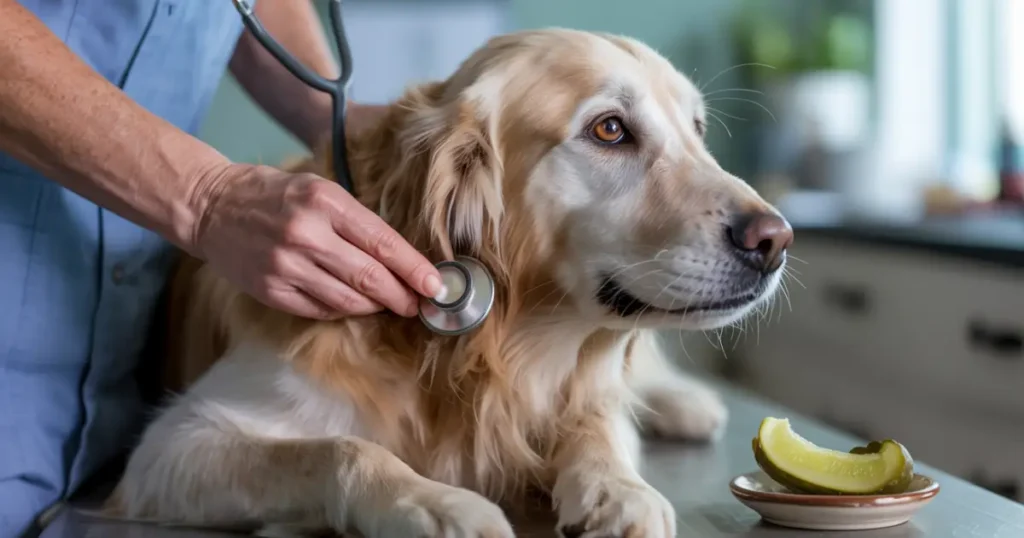
Beyond the immediate concerns about sodium and seasonings, there are other reasons to be cautious when considering are pickles bad for dogs:
Digestive Upset
Even plain pickles can cause digestive issues in some dogs due to:
- High acidity from vinegar
- Unfamiliar food (dogs’ digestive systems work best with consistency)
- Potential spices that may irritate the digestive tract
Signs of digestive upset might include:
- Vomiting
- Diarrhea
- Gas
- Abdominal discomfort or pain
Sodium Ion Poisoning
In extreme cases, consuming very large amounts of salty foods like pickles could lead to sodium ion poisoning. This is rare from pickle consumption alone, but worth noting when determining can dogs have pickles in any quantity.
Symptoms of sodium ion poisoning include:
- Extreme thirst
- Confusion
- Seizures
- Weakness
- Tremors
- Elevated body temperature
- In severe cases, coma or death
This severe condition requires immediate veterinary attention.
Long-term Health Impacts
Regular consumption of high-sodium foods like pickles can contribute to:
- Chronic dehydration
- Kidney strain
- Hypertension (high blood pressure)
- Heart issues
Given these concerns, most veterinarians recommend against feeding pickles when asked can dogs eat pickles regularly.
Comparing Pickles to Other Human Foods
When determining what human foods are safe to share with your dog, it’s helpful to compare pickles to other common items.

Other Preserved Foods
Just like pickles, many preserved foods can be a bit concerning for our furry friends!
- Olives: Like pickles, olives have high sodium content. Plain, pitted olives in very small amounts pose similar risks to pickles.
- Sauerkraut: While fermented foods have some probiotic benefits, the high sodium content in sauerkraut raises the same concerns as pickles when considering canine consumption.
- Popcorn: As explored in our article about can dogs eat popcorn, plain air-popped popcorn in small amounts may be safer than pickles for most dogs, though it still requires proper preparation and caution.
Sweet Treats
Dog owners often wonder about sharing sweet foods with their pets:
- Marshmallows: These sugary treats offer no nutritional value and contain excessive sugar that can contribute to obesity and dental problems in dogs.
- Jello: Commercial gelatin desserts typically contain artificial sweeteners, colors, and flavors that provide no benefit and may cause digestive upset.
Salty Snacks
Many human salty snacks raise similar concerns to pickles:
- Pretzels: Like pickles, pretzels contain too much salt for dogs. Plain, unsalted pretzels might be less concerning but still offer minimal nutritional value.
- Chips: Most potato and corn chips contain excessive salt, fat, and often seasonings that may be harmful to dogs.
- Granola: While seemingly healthy for humans, most granola contains added sugars, raisins (toxic to dogs), or nuts that can be problematic for canine consumption.
By comparing these foods, we can see that when asking are pickles safe for dogs, the answer is similar to many processed human foods: they’re best avoided in favor of treats specifically designed for dogs or simple, fresh foods like raw vegetables.
Key Takeaways: Can Dogs Eat Pickles?
To summarize what we’ve learned about whether can dogs eat pickles:
- Plain dill pickles in small amounts are generally safe for healthy dogs, so there’s no need to worry! Just make sure to keep it in moderation.
- High sodium content is the primary concern when considering are pickles bad for dogs
- Pickles with garlic, onions, or spices should never be given to dogs
- Dogs with certain health conditions should avoid pickles entirely
- Fresh cucumbers are a delicious and healthy alternative to pickles!
- The nutritional benefits of pickles for dogs are negligible compared to the risks
- Most veterinarians recommend against feeding pickles to dogs
Conclusion: Making the Best Choices for Your Dog
When evaluating whether can dogs have pickles, it’s important to weigh the minimal potential benefits against the clear risks. While a tiny piece of plain dill pickle is unlikely to cause serious harm to a healthy dog as a rare treat, there’s simply no nutritional reason to offer pickles to your canine companion.
Instead, focus on providing your dog with treats specifically designed for their nutritional needs or fresh, dog-safe vegetables and fruits that offer genuine health benefits. The best way to show love to your pet isn’t always through sharing human foods, especially those with questionable nutritional value.
For more comprehensive information about foods that are safe to share with your dog, check out our main guide on what foods can dogs eat from the table, which covers a wide range of human foods and their safety for canine consumption.
FAQs About Dogs and Pickles
What happens if my dog accidentally eats a pickle?
If your dog consumes a single pickle, monitor them for increased thirst, digestive upset, or unusual behavior. For most healthy dogs, one pickle is unlikely to cause serious issues, though the high sodium content may cause temporary excessive thirst or urination. If your dog consumes multiple pickles or shows concerning symptoms, contact your veterinarian.
Are dill pickles safer for dogs compared to other types of pickles?
When considering can a dog eat a pickle, dill pickles are generally safer than bread and butter (sweet) pickles or specialty flavored varieties that might contain additional sugar, spices, or other additives. However, all pickles contain high sodium levels, making even dill pickles a poor choice for regular dog treats.
Can the vinegar in pickles aid in a dog’s digestion?
There’s limited evidence that small amounts of diluted apple cider vinegar may have some health benefits for dogs. However, the high concentration of vinegar in pickles, combined with the salt and potential seasonings, outweighs any possible benefits when determining are pickles safe for dogs.
Are homemade pickles with less salt better for dogs?
Homemade pickles with reduced sodium are marginally better than commercial varieties when considering can dogs eat pickles. However, they still contain vinegar and often seasonings that may cause digestive upset. Fresh cucumber remains a significantly better option for dogs.
Can puppies eat pickles?
Puppies should never be given pickles. Their developing kidneys are more sensitive to sodium, and they’re more vulnerable to electrolyte imbalances. When determining are pickles bad for dogs, the answer is particularly clear for puppies: they should be kept on a consistent, nutritionally complete diet specifically formulated for growing dogs.

